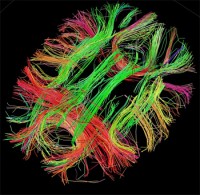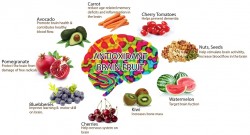■ 16 MARCH 2014 | 10:10 AM
 University of California Berkley (UC Berkley) researchers now believe that long term stress experienced from traumatic events (PTSD) can lead to future emotional and mental illnesses. Anxiety and mood disorders top their list of potential, future disorders. The key to their finding reflects the delicate balance between the ‘gray and white matter’ in the brain. While their findings seem logical, the good news is there is something that can help the brain heal through both medicine and nutrition.
University of California Berkley (UC Berkley) researchers now believe that long term stress experienced from traumatic events (PTSD) can lead to future emotional and mental illnesses. Anxiety and mood disorders top their list of potential, future disorders. The key to their finding reflects the delicate balance between the ‘gray and white matter’ in the brain. While their findings seem logical, the good news is there is something that can help the brain heal through both medicine and nutrition.The ‘gray’ matter inside our brain houses the neurons (storage/processing). ‘White’ matter is housed inside a white fatty myelin sheath comprised of axons that help neurons interconnect. The balancing act between both comes under attack when chronic stress occurs in the brain, resulting in over production of myelin. Too much white matter = fewer neurons than normal, impacting communication in the brain.
“We studied only one part of the brain, the hippocampus, but our findings could provide insight into how white matter is changing in conditions such as schizophrenia, autism, depression, suicide, ADHD and PTSD." (Daniela Kaufer, UC Berkeley, Associate Professor of Integrative Biology).
The balancing act between the two separate areas of the brain that control our responses (‘flight/fight’ versus moderation) start failing to work in balance with one another.
“You can imagine that if your amygdala and hippocampus are better connected, that could mean that your fear responses are much quicker, which is something you see in stress survivors,” she said. “On the other hand, if your connections are not so good to the prefrontal cortex, your ability to shut down responses is impaired. So, when you are in a stressful situation, the inhibitory pathways from the prefrontal cortex telling you not to get stressed don’t work as well as the amygdala shouting to the hippocampus, ‘This is terrible!’ You have a much bigger response then you should.”
In addition to future illness/disease, memory and learning can be impacted almost immediately. Many PTSD (Post Traumatic Syndrome Disease) patients begin experiencing symptoms similar to ADD and ADHD (Attention Deficit Disorder and Attention Deficit Hypertension Disorder).
Nutrition – Omega 3 fatty acids and Antioxidants
Omega 3 fatty acids feed the brain and help assist in brain performance/function. The best resources for these fatty acids are oily fish (i.e. Salmon, Tuna, Herring, Bluefish, Anchovies and Mackerel). Fresh catch (versus farm raised) from the USA are the best choice. Natural seed oils (i.e. Flax, olive oil) along with healthy nuts (Walnuts, Almonds) also assist in providing these essential acids, as well.
Antioxidants play an equal role in assisting brain performance. Vitamin B found in green/leafy plant food (i.e. Kale, romaine lettuce, spinach) helps your body naturally make energy, produce healthy red blood cells while benefiting brain function. Natural sulfur found in food (garlic, onion, cabbage, broccoli, radishes, asparagus, etc.) assists in maintaining oxygen balance in the brain. Berries and cherries act as an anti-inflammatory, helping to relieve stress in the brain, as well.
Colorful plant food = Greater impact

A great rule of thumb to remember when selecting plant food is: The brighter the better!
Phytochemicals give plant food their ‘color’ and indicate their ability to work well with other vitamins, minerals and fiber.
Nutrition + medicine = Better chance of balanced healing
Nutrition with medicine can help the brain recover from stress, create emotional balance and help the body overall. But one without the other may not completely help the brain to heal, naturally. What we feed our brain is what will ultimately help our entire body. If your doctor has prescribed medicine, ask what food you should be incorporating into your treatment plan, as well.
 Exercise + Antioxidants = Natural stress relief
Exercise + Antioxidants = Natural stress reliefAntioxidants supply the brain with the natural energy it needs to build, renew and restore. The brain utilizes antioxidants to counteract the damage caused by ‘free radicals’ (the result of oxidative stress). Exercise, along with balanced nutrition, is vital in helping the brain recover – especially after suffering from extreme stress. The easiest way to consume your antioxidants is through nutrition, not supplements. The mistake we make is in thinking that the supplement will support what our body needs. Consuming supplements can lead to a lack of discipline when developing a healthy, balanced lifestyle. It becomes too easy to dismiss the discipline of nutrition because we start believing we’re feeding our body nutrition in another form (via supplements).
If your doctor has prescribed supplements, ask them to provide you with a dietary guideline for your daily nutrition, as well. Typically, you will be referred to a Registered Dietitian who can help determine what your body requires, may be lacking and how to develop a healthy track for your future.
Quick Tips for Wellness: What we ‘feed’ the brain, we feed our overall wellness.
Quick Tips for Wellness ™ Copyright © 2014, All Rights Reserved
Follow Pat on Facebook at Quick Tips for Wellness and Live Life Well Now and on Twitter @wellnesstips4u
Visit Pat’s website www.livelifewellnow.net to learn more about her Nutrition Seminars, Wellness Guide and Cookbook (Foods you love to eat made healthier!)
Resources: https://newscenter.berkeley.edu/2014/02/11/chronic-stress-predisposes-brain-to-mental-illness/
http://hamptonroads.com/2014/03/long-term-effects-stress-brain-will-brain-stress-lead-future-illness
0 comments:
Post a Comment